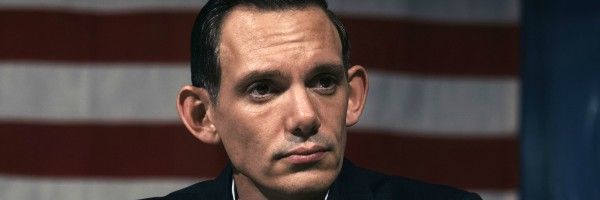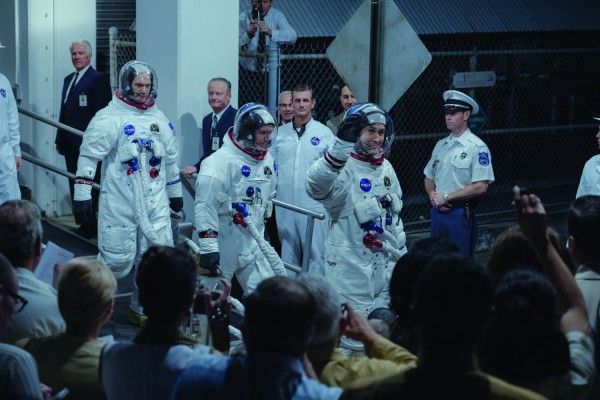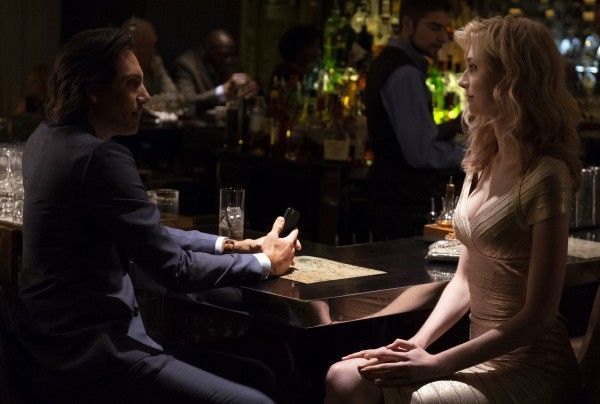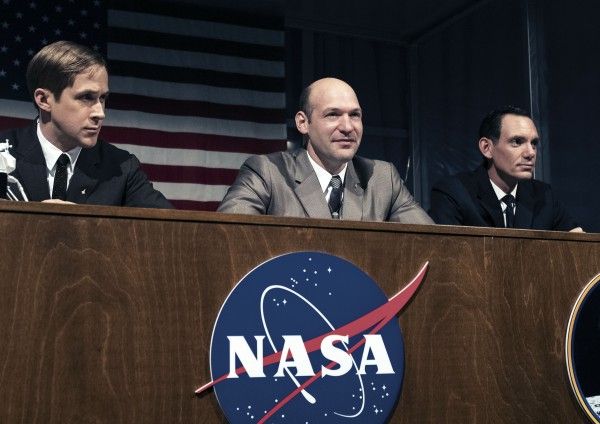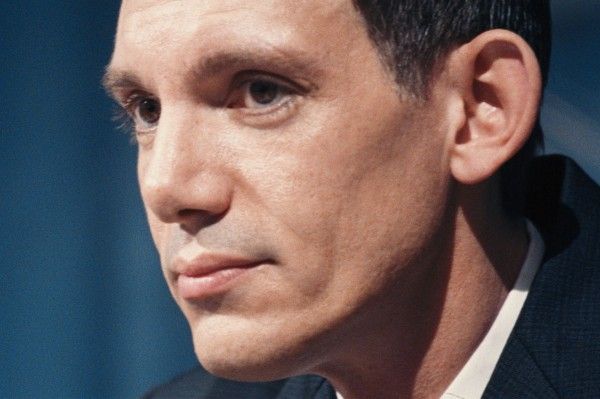Actor Lukas Haas has had a pretty great year, with stand-out roles in two Oscar contender films. In First Man, which tells the riveting story behind the first manned mission to the moon, he portrays astronaut Michael Collins, opposite Ryan Gosling’s Neil Armstrong, and in Widows, he plays a commitment-phobic real estate executive named David, who prefers a transactional relationship to romance. And while the roles in each film couldn’t be more different, the experiences he had with directors Damien Chazelle (La La Land) and Steve McQueen (12 Years A Slave) illustrate why they are two of the most compelling filmmakers working today.
During this 1-on-1 phone interview with Collider, Lukas Haas talked about how lucky he feels to be in two films that he’s so proud of, how the shoot for one film was only days long compared to months of preparation and shooting on the other, the similarities and differences between Steve McQueen and Damien Chazelle, and figuring out the motives of his Widows character. He also talked about how working with Steven Spielberg (in Amazing Stories and on Lincoln) compared to working with Christopher Nolan (on Inception), as well as what his next project will be.
Collider: As an actor, in an industry that can and often is very unpredictable, what does that feel like to be in two films in Oscar contention, in the same year?
LUKAS HAAS: It’s been a great feeling this year. It’s pretty amazing because it’s hard, these days, to find a single film that you’re gonna be proud of, let alone to get cast in it. It’s hard to search out those really beautiful movies. And so, I’m just incredibly blessed. I feel so lucky. I don’t even really know what to think. I just got really lucky, and I was there at the right time.
It’s also very cool that they’re such different movies.
HAAS: I know. I actually did Widows first. I think somebody else was cast for that role and had to drop out, for whatever reason, and they were scrambling to find somebody quickly. My manager hit my up and asked me to self-tape, really quickly, that day. They were like, “You have to send it in now, or it’s gonna be too late.” So, I called my friend over and they helped me record it with my iPhone. I just read off of the page and sent them a little audition, and I got a call later that day from (director) Steve [McQueen] saying that I got the role. And then, I was in Chicago, two weeks later, for filming. It really just happened out of nowhere, and I was there for maybe a week, if that. Everything that I shot was packed into three days.
And then, First Man was the opposite. I was there for four months, or something like that, and there was a whole process. I got to go to NASA, see everything and ask every question, and we had astronauts escorting us through it. We went to not just Florida, but Houston, traveling from NASA to NASA and checking everything out. It was very, very cool. That whole part of the experience was the coolest film field trip that I’ve ever been on, for sure. That was the coolest preparation period that I’ve ever had. It was so cool. It’s just interesting how it took a few days to film one, and months to film the other. I love working and I love acting, so I like being on the set for a long time. I would have been happy to be in Chicago for a few months (for Widows), if it took that. And First Man was just the coolest film that I’ve ever seen being made. It’s hard to explain just how cool it was. I went to set every day, and it was just so rad working with Damien [Chazelle]. I’m a major fan of his, so I was especially excited about it. Everybody was excited about it. I’m not a fan kind of a guy, so when there’s someone that I really am a fan of, I’m extra excited to work with them.
I think Steven McQueen and Damien Chazelle are two of the most exciting filmmakers working today, and as exciting as their movies are now, I’m even more excited to see what they do, in the future. How was the experience of working with each of them? Were there any ways in which they approached filmmaking from a similar point of view, or are they very different filmmakers?
HAAS: They actually do have some similarities. They’re different personality types. Some directors are gregarious and loud and commanding, and some are more thoughtful. I’d definitely put Damien and Steve in that category. For my taste, of the people that I’ve worked with, Peter Weir (who directed Witness), Rian Johnson, who directed this movie Brick that I did, and Steve and Damien, all have this really lovely, warm, calm disposition. And Steve and Damien are incredibly generous directors. They listen. They’re engaged in the moment. They both want to know what you have to say, and they want to know what everyone has to say. They are so well-prepared. They’re living and breathing what they do, so there’s never any disconnect. Sometimes on a film, especially when you’ve been in a lot of them, you know the rhythm and what would be the right direction, going in. But with guys like them, you can see how they move through the day and through their scenes, and how they choose to shoot things. They’re both true artists. That’s what it boils down to. They’re trying to create something visceral, and they’re trying to connect, in a real way that’s special. I hope that there’s more of that in the world.
You’ve worked with some pretty great filmmakers, throughout your career. How would you compare working with Steven Spielberg to working with Christopher Nolan? Are there any similarities among those two?
HAAS: That’s interesting. So, I had a very particular experience with Steven Spielberg. I was really young when I first really worked with him. When I was in Amazing Stories, it was literally the most fun that I’d ever had on anything. The set was like a playground. We were shooting at Universal, too, which is almost like a ride. Steven would ask me, if I wanted to do it again, just because it was that fun. They would reset all of the spots, and a train would come through the house. There were all of these special effects that were in camera. I was a little kid, working with him, but he was so fun. He’s just awesome. He’s a special guy. Both Steven Spielberg and Chris Nolan are guys who are not aggressive, but are commanding type. Chris Nolan is definitely like that. He just has a vision, and he’s the commander-in-chief, for sure. He delegates. He has a very clear vision of the scene, and he sets up that scenario while the actors fit into it. Whereas with Damien [Chazelle], and people like that, at least in my experience, it’s way more about connecting to each other and working with each other. Chris is a little more of a guy who has this grand vision and he wants to execute it, and you’re a part of his palette. Really, that’s the case with any director, but some directors are more engaging, in the moment. They want to mine the actor to get what they’re looking to get.
I loved your performance in Widows because it’s such an interesting character. He’s this guy that seems like he’s saying all of the right things, but he’s also just very transactional and matter-of-fact. Having jumped into that role as quickly as you did, did you have time to find that balance and how you wanted to play him?
HAAS: A lot of those dynamics were just built into the role, so all you had to do, as an actor, in that case, was get out of the way. What was really important for him is to be charming, so that you believe that she would want to go with him, even though the scenario is maybe not something she would normally do. I recognized that, and I went into it with the very simple goal of trying to charm her. The transactional thing was funny because he’s not a bad guy. He’s in the middle somewhere. When you see the film, you’re not sure about him, but the truth is that he’s actually, at least from my perspective, being honest with her. He was not just trying to sleep with her and never talk to her again. He explained himself to her and told her where he’s coming from, and he was pretty clear and honest about it, from the beginning. That’s what’s cool about Steve [McQueen] and (writer) Gillian [Flynn].
He’s an interesting character that has these different sides. From the way that I looked at it, he’s a guy who was scared of the commitment part of it and was nervous about the closer connection. At least, that’s how I played it. It could’ve been that he was lying and he had a family, but I didn’t think of it that way. I thought of him as a guy who just had trouble with intimacy and didn’t know how to really let himself go that way, so the transactional thing was good for him. He used that to be able to get to a woman, and to protect himself, emotionally. It was a really interesting role. You have to think of the character’s motives, and all he really is trying to do is impress her and make her like him, so that’s all I was doing. I kept it pretty simple like that. And Steve was just so generous and warm. I think he could tell that I was on the nervous side. I hadn’t really been in a situation like that in a bit, with a big role in a big movie, and he was just so encouraging and warm and helpful and attentive. He was just there, supporting me and rooting for me. He’s a cool guy, and it was just a cool experience.
When you do such great work, especially like these last couple of films, does it make it harder for you to find things that you get excited about?
HAAS: No, it doesn’t, only because it opens some doors. You go through phases, as an actor. It changes, all the time. The whole business has changed so much, too. You never know if you’re gonna find something that you’re gonna like. That’s why it’s so exciting to get two of them in one year, like that. But, that’s rare for me. I just try to do the movies that I really connect to and that I really love, but there aren’t that many of them out there. You can’t always just do what you love, unfortunately but you try to get as close as you can. But I’m getting some scripts now, that I wouldn’t have gotten before these movies, so it opens up that side of things. It’s great. It’s such a nice way to establish yourself again, for the movies that are contender types, which are the kind of movies that I love to make and are consistent with my early career. Honestly, I’ve gotten super lucky. I’ve worked hard for it, but it still takes a lot of good fortune and good timing.
Do you know what you’re going to do next, as an actor, or are you in the process of trying to figure that out?
HAAS: My next film is called The Violent Heart, by this guy named Kerem Sanga. His last movie (First Girl I Loved) won an award at Sundance, two years ago, and that was a beautiful movie. The script is really cool and it’s a really cool role, so I’m excited. I start filming that in February.
First Man and Widows are now playing in theaters.

